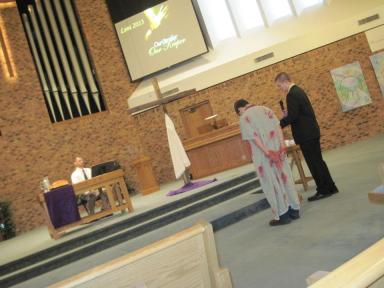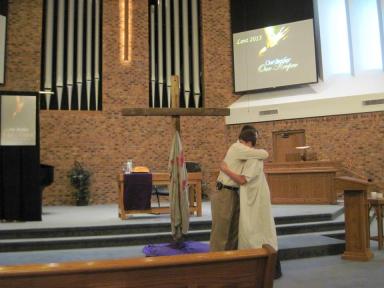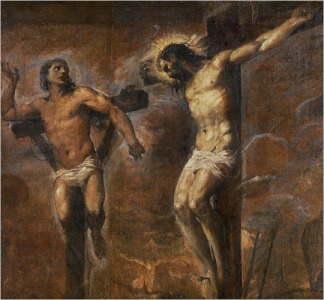 I wrote this for our Good Friday service. Inspired by an idea one of our worship planners had from Zechariah 3, we witness Satan as the accuser of a child of God at the judgment seat where God presides. In this, we are reminded once again that “though our sins are like scarlet, they shall be white as snow.”
I wrote this for our Good Friday service. Inspired by an idea one of our worship planners had from Zechariah 3, we witness Satan as the accuser of a child of God at the judgment seat where God presides. In this, we are reminded once again that “though our sins are like scarlet, they shall be white as snow.”
The scene begins with Satan leading a man before God’s throne. The man is bound and dressed in a robe that is stained with splotches of red. The dialogue is between Satan and God as the man simply stands in silence awaiting his judgment.
God: Satan, you come again to accuse. Who do you bring before me today?
Satan: I bring another wretched sinner. His name is of no consequence.
God: Tell me his name. It is of great consequence to me. He is my creation.
Satan: If you know him, why must I say his name?
God: You must acknowledge the uniqueness and beauty of what I have made. I demand
that you acknowledge his name, a creature made in my image.
Satan: Matthew. I bring before you Matthew. (pause)
In your great knowledge, you know I speak no lie before you.
You call him a creation of uniqueness and beauty, yet this creature before you is a
repulsive criminal. You may call him Matthew. I call ‘em like I see ‘em. He’s just like
all the rest, another human dripping with selfishness, lust, hatred, deceit, envy, and
pride.
The only uniqueness in him is how he’s learned to sin so creatively,
the secrets he’s kept,
the sinful shadows in which he’s hidden,
the subtle acts of revenge he’s rendered,
the selfish manipulations played to get his way.
As the evidence will show, and I have plenty, he is guilty. Guilty.
In your infinite wisdom and holiness, no other verdict will be possible.
God: Matthew, you come alone. Is there no one offering a defense on your behalf?
Satan: Who would give defense? His friends? His family? Any human for that matter?
How could their words be trusted? They are as guilty as he. Their mouths would
only speak ignorant lies.
They sound petty in their judgments. Didn’t you hear their foolish babble at his
funeral? They speak such niceties. I’m surprised they couldn’t hear me laughing at
their tall tales. I’ll admit, to the casual observer, he was better than many. He had a
certain shallow righteousness about himself, but you and I know better, and you
better than I.
For every good thing that could be said about him, I have ten or more things to tell
on the other side.
God: So, he has no defense?
Satan: As I’ve already pointed out, no legitimate defense is available – and it wouldn’t do
him any good. This isn’t a court of public opinion, is it, one based on their easy
standards? Isn’t this your court, the court of the most holy and righteous God?
What did you tell your people? “Be holy because I, the LORD your God, am holy.”
If that’s the standard, who dare stand before you and give defense?
Guilty is the only plea to enter. He’s guilty!
God: Guilty is his plea? So, he acknowledges his guilt?
Satan: All of it. He offers no excuses, no explanations, no justifications for his miserable
life. It is piled high with sin. Where should I even start?
From what category would you like to start – his actions, his thoughts, his
omissions?
From what commandment would you like to start – the first, the fifth, the sixth, the
tenth?
Where should I start?
God: I think we should start by acknowledging the truth.
Satan: That’s what I’m doing, speaking the truth. Bearing light upon the darkness of his
soul. Letting you see the truth.
God: Do not speak your lies to me. You, a messenger of light? I don’t need you to see the
truth. I am the light that gives vision. Your desire is to make people blind, to darken
their eyes. You desire to consume lives, to enslave them to your eternal darkness.
You were a murderer from the beginning and you do not stand in the truth,
because there is no truth in you.
You only speak lies, because you are the father of lies.
Satan: Do I not speak the truth about his guilt?
God: You speak what is advantageous to your destructive ways.
He acknowledges his guilt, so you seek to destroy him with it.
For the one who pleads not guilty, you encourage their sense of innocence so they
will see no need to repent.
It is all a ploy, a deceitful and manipulative ploy to destroy and to keep my creatures
and me apart.
Satan: But in my defense, do I not speak truth about his guilt?
God: You do not speak truth about me – of who I am, of what I have done.
Satan: Are his sins not apparent to you? Are you blinded by your own light?
His sins are like scarlet? He is stained with sin. He is not clean.
God: Though Matthew’s sins are like scarlet, they shall be white as snow.
I am the LORD, the compassionate and gracious God, slow to anger,
abounding in love and faithfulness, maintaining love to thousands,
and forgiving wickedness, rebellion and sin.
Satan: He is guilty. He belongs to me.
God: No, he belongs to me! He’s my creation. And in my Son’s sacrifice, he is my
recreation.
Satan: Don’t bring him into it.
God: We must. He is the light of the world that shines in the darkness. He is the way, the
truth, and the life that exposes the lies that you tell.
You say you speak truth, but you speak nothing of my Son who is truth incarnate.
Satan, leave this courtroom.
Satan: But his guilt.
God: His guilt has been taken away. Leave my presence!
(Satan, with stern resignation, gathers his papers, pounds them on the lectern
and walks out, leaving Matthew standing before his Creator).
Matthew, though your sins were like scarlet, in my Son they are white as snow.
Though you come before me with stained garments of sin and shame,
I’m here to clothe you with my Son’s garment of righteousness.
(At this point, God stands up and places the cross between the judge’s bench and
where Matthew stands. The cross has upon it a white garment. After setting the
cross down, he comes to Matthew, takes off his stained garment and switches it
with the white garment representing Jesus’ righteousness. The stained garment is
placed on the cross and the white garment is placed on Matthew).
Matthew, through faith in my Son, you too have become my child.
I love you.
(God embraces Matthew and they walk out together).
 “The people walking in darkness have seen a great light; on those living in the land of the shadow of death a light has dawned…For to us a child is born, to us a son is given.” (Isaiah 2, 9.6a)
“The people walking in darkness have seen a great light; on those living in the land of the shadow of death a light has dawned…For to us a child is born, to us a son is given.” (Isaiah 2, 9.6a)





 owing anymore, but it is. The flurries continue to bring fury into our thoughts. “Just warm up already!” we think as we walk again into the cold and frigid wilderness. It’s not that we expect last year’s 75 degrees, but 28 degrees? It was 14 degrees last night! It’s Easter next week. Opening day of baseball follows a day after. We’re planning a sunrise service for Easter. We might have to stay inside. The Tigers open in Minnesota. I’m sure they’re lamenting that the Metrodome isn’t still being utilized. Needless to say, we’re all anxious to get on with things, to at least top out at 50 degrees and have April showers, of rain that is. We want to see the daffodils pop and the robins return.
owing anymore, but it is. The flurries continue to bring fury into our thoughts. “Just warm up already!” we think as we walk again into the cold and frigid wilderness. It’s not that we expect last year’s 75 degrees, but 28 degrees? It was 14 degrees last night! It’s Easter next week. Opening day of baseball follows a day after. We’re planning a sunrise service for Easter. We might have to stay inside. The Tigers open in Minnesota. I’m sure they’re lamenting that the Metrodome isn’t still being utilized. Needless to say, we’re all anxious to get on with things, to at least top out at 50 degrees and have April showers, of rain that is. We want to see the daffodils pop and the robins return.


